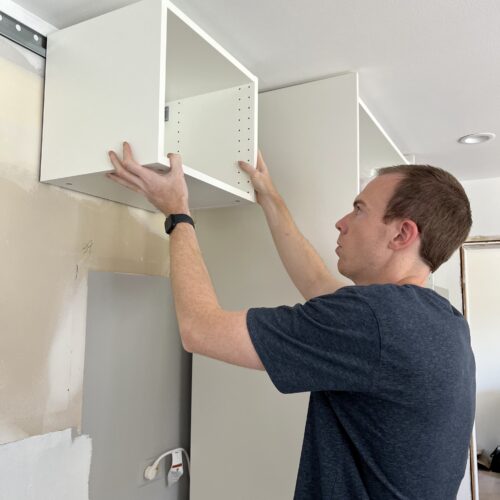When it comes to hiring a contractor or specific trade for our home, the process can be stressful. Although we’re not experts, we’re here to help answer some of the FAQs regarding hiring contractors and trades. Over the years we’ve gained experience hiring various trades at both our city condo and now our suburban home.
Disclaimer: Any information provided below is opinion based on our personal experiences and personal research. The material and information contained on this website is for general informational purposes only. You should not rely upon the material or information on the website for making business, legal, or any other decisions.
Hiring a Contractor vs. Individual Trades
How do we know when to hire a contractor to manage our project or hire an individual trade? Kam and I have experienced both situations and we definitely have a strong preference when it comes to this question. If not familiar, a contractor’s role in a project is to manage the project, the budget, the schedule, and all of the individual trades. If we’re working on a large-scale renovation project, a contractor will probably be our best option. The main benefit of having a contractor is they have the responsibility of the major coordination for the project so we can be more hands-off, however, that comes with a cost (in our opinion).
It is our personal preference to hire out individual trades as much as possible. When we are hiring a contractor, we are trusting the contractor to make decisions for us. This includes hiring their own trades or subs-contractors. They’re most likely to use their personally preferred subs, which may not necessarily benefit us. If we hire individual trades, we have more control in what company we ultimately decide on. Before they’re hired, we can speak with the trade directly, do our own research, check online reviews, ask more details on pricing, and in general can learn way more about them.
Each time we’ve used a contractor (which is twice now) we’ve found that we do not like the lack of control over the project. Fortunately, the projects have been completed successfully, but moving forward our preference is to hire out individual trades.
How Do We Know What Trade to Use?
This is a great question that we don’t always know the answer to. How do we know what trade to use for a project we are looking to do? When in doubt, I always try to use google first. We can try googling, “who do you hire to fix XYZ” or “what trade works on XYZ”. If that isn’t helpful, we like to turn to our town’s Facebook group which we reference often for questions or recommendations. Chances are, if we’re looking to do a project someone else in our area has done it before too. Lastly, if we’re still unclear about which trade to use, we’d make our best guess based on the research we’ve done and give some companies a quick call! Don’t be afraid to ask questions.
Where Do We Find The Trades We Hire?
When researching potential companies to hire, Kam and I always start at the same two places. We typically rely on personal recommendations (from other trades, neighbors, etc.) or we search our town’s Facebook group. Every city we have lived in has had a town Facebook group that you can join for all kinds of info, so we will search the group history or make a post asking for recommendations. We try to make sure the recommendations are from people who have actually hired the trade in the past. For most of our projects we develop a list of potential options from both sources. If neither of those are an option, I’d simply turn to searching for options on google.
Researching Online Reviews and the BBB
Once we’ve got a list of potential companies for our project, we like to go down the list and research their online reviews. We will look at reviews primarily on google, but it is also good to check Yelp, Facebook, Angie’s list, etc. Reviews can be very telling if a company is reliable and trust-worthy. Based on reviews, we’ll start to rank our options or eliminate options completely if they do not seem like a good fit. After we get bids and before we make our final decision, we will double check their reviews and their BBB (Better Business Bureau) rating. We typically check their BBB by googling “Company Name BBB”.
How Do We Know if it’s a Fair Price?
This is a tricky one. I used to start by googling “how much does it cost for XYZ?” and many, many times google has completely mislead me on a ballpark figure for a project. Now, we make sure we get at least 3 bids or quotes for each project. We also like to get quotes from both small and large companies. In our experience, smaller companies tend to have lower prices. Sometimes when we get our 3 bids back, they’ll all be very similar in price which makes the decision a little bit easier. Keep in mind you get what you pay for, so we try not to go with the lowest bid. We’ll usually eliminate the lowest and look at our options from there.
We’ve Selected Our Contractor or Trade – Now What?
When we’ve selected the company we are hiring for our project, we always make sure we have a written contract. We need to understand the scope of the work being performed, the cost for the project, any required deposits or payment schedule, if we’re required to provide or pay for any materials, etc. Even if it is someone we’ve worked with before, I like to at least have a written confirmation via text or email on scope, price, and timing, but a contract is always the more prudent way to go.
Before we sign the contract, we make sure that we understand if any deposits are required. In our experience, deposits have varied from trade to trade. Some trades require 50% deposit while some require nothing. It’s also important that we never fully pay for the work up front. I typically won’t even provide for a deposit before Day 1 unless it is a company we have worked with before. We want to make sure that we are getting the services we agreed to before the trade is getting paid.
Another reason contracts can help protect is simply by knowing the company’s formal business name. Kam and I recently got a quote for a company we found on a google and when we got the formal quote the company name was different. This is a huge red flag, a reputable company will not have multiple names.
Requirements on License, Bond, and Insurance?
It is important that any company we hire is licensed, bonded, and insured. A license is required by law for contractors or trades performing work and it is typically issued by a state license board. A company’s license number should be included on their website, contract, or quote. Bond’s are typically required for a contractor to have a license and guarantees a contractor’s legal and financial obligations. States also typically require a contractor to have various types of insurance but it is always good to confirm. When working on any projects in our city condo, we were required to provide proof of license and certificate of insurance for a minimum of $1,000,000 (we also double check the dates are active on the COI).
What if We’re Not Happy With the Quality of Work Provided?
Great question and this has probably happened in some form to all of us who have hired out. If we are mid-project and not happy with the quality of work being performed, I would speak up immediately. Most of the time this can be resolved by having a conversation, confirming expectations, and allowing the trade to correct their work. If the project is completed, I would first try to understand if there is a guarantee for their work outlined within the contract. If so, talk to them about it and explain the situation. We’ve asked a few trades to come out and fix minor things after the fact and they’ve typically been responsive. If they’re not responsive, worst case we can turn to leaving a negative review, filing a BBB claim, or consulting a lawyer. We may also decide to fix the work ourselves and choose to not use the company again.
Final Thoughts on Hiring Trades
Our key takeaways on hiring trades are research potential companies, check reviews, confirm they are licensed, bonded, and insured, and have a written contract. Sometimes things just happen, but by doing thorough research up front, hopefully we’ll all have a good outcome when it comes to hiring a contractor or trade for a project.


